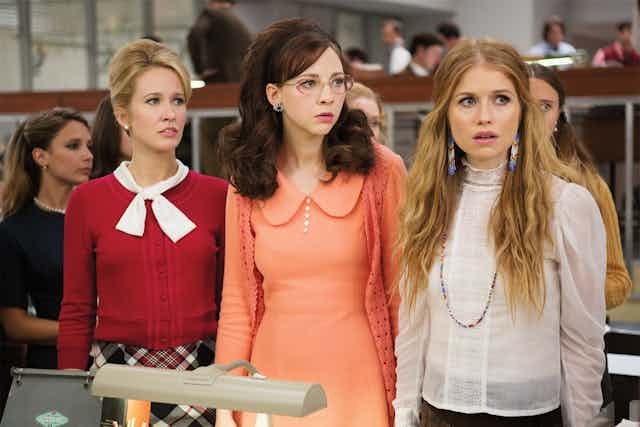I wrote recently that Amazon and Netfix were leading the way in improving the gender balance in writing for television. In a post-Weinstein industry, there is more and more discussion about women’s representation in film and television. Right now, however, Amazon Studios has an image problem.
There is currently an industry-wide push for the employment and promotion of women in key crew roles such as director, showrunner, writer and cinematographer. Despite this, Amazon has axed three original series helmed by women: Good Girls Revolt, One Mississippi and I Love Dick.
The story of Good Girls Revolt goes back further than this year, but is key in demonstrating Amazon’s attitude towards feedback from its audiences.
In 2016, Amazon premiered the first season of Good Girls Revolt, an original series from showrunner, Dana Calvo, based on the book by Lynn Povich. Good Girls Revolt tells the true story of the women of Newsweek (in the series, News of the Week) who sued the magazine for sexual discrimination in 1970. The drama received critical acclaim and was well-received by female audiences, in particular. But Amazon Studios’ then-chief, Roy Price, decided to discontinue the series after its first season.
The cancellation of Good Girls Revolt caused an online uproar, with the series’ stars and crew leading a charge on a #SaveGoodGirlsRevolt tagline on Twitter, and audiences crying out for the series to find a new home.
The Weinstein scandal
Following the Harvey Weinstein scandal in 2017, Roy Price was stood down at Amazon Studios following allegations of sexual harassment made by a female producer. Sharon Tal Yguado, formerly in charge of event series for Amazon, was promoted to head of scripted programming, and Amazon Studios was in line for an overhaul. Fans of Good Girls Revolt found new hope, as Calvo and her team prepared their season two pitch to be shopped around to various outlets, including Amazon Studios itself. However, in a statement on January 11, Calvo announced on Instagram that Good Girls Revolt would not be revived. The fight was over.
This final cancellation of Good Girls Revolt, while disappointing for crew, cast and fans alike, is hardly an unusual event in the world of television. The long-lived series is becoming rare and the performance of series made specifically for Netflix, Amazon or Hulu is measured not in ratings, but in completion and contribution to platform subscriptions. That is to say, how many viewers watch the series all the way through and whether new customers sign up in order to watch them. Since Amazon and Netflix do not publish viewing statistics, there is no way for the public to know why they make particular programming decisions, apart from official statements.
It is not the discontinuation of Good Girls Revolt alone that has caused Amazon’s image problem. With Netflix championing Orange Is the New Black and GLOW, and Hulu’s runaway success with The Handmaid’s Tale, surely Amazon could do more to actively greenlight and support scripted series written by and for women?
More bad news
On January 17 came more bad news for female-created content on Amazon. Amazon Studios announced it was cancelling three original series. Two of these (One Mississippi and I Love Dick) were helmed and predominantly written by women.
It has been reported that Amazon is looking for its very own Game of Thrones. Nevertheless, audiences and industry are puzzled by the cancellation of Tig Notaro’s One Mississippi, in particular. With a 96% rating on Rotten Tomatoes, the series is also one of very few to feature a queer protagonist, and a woman at that.
While I Love Dick received fewer accolades, it marked the only series on Amazon’s slate to feature an entirely female writing team. An Amazon “insider” told Deadline: “This is part of a move towards bigger, wider-audience series.” But it is the ability to cater to niche audience markets that makes online original content platforms unique.
In the wake of Hollywood’s sexism overhaul, why has Amazon chosen this time to withdraw support for female-led content? Actors and Hollywood leaders including Ava Du Vernay, Reese Witherspoon and Jessica Chastain are calling for drastic improvements to the gender problem in the entertainment industry, but outlets do not seem to be responding quickly enough. With this latest spate of cancellations, how will Amazon improve its contribution to a balanced and fair production industry?

